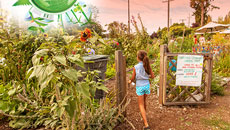An expert weighs in on how to adopt a healthier lifestyle and make more nutritious choices.
Attempting to adopt a healthier lifestyle is something most of us have grappled with at some point. For those struggling to forge healthier habits, Vashti Verbowski, a registered and private practice dietitian at Your Kitchen Dietitian recommends examining problematic behaviours and coming up with new strategies.
The dietitian explains that small, realistic diet changes are the best way to make progress, “drastic diet changes don’t usually last, and people tend to end up right where they started – the key is to make gradual changes that are doable and become part of your lifestyle.”
Verbowski’s top three suggestions for a healthier diet
Through her numerous years as a dietitian, Verbowski has helped many clients in Vancouver create more nutritious daily diets, and believes that implementing the following tips are essential:
1. I recommend filling half of your plate with vegetables at every meal. Boost your nutrition by choosing colourful vegetables – the deeper the colour, the better. As a rule, I recommend including at least one green vegetable (e.g. broccoli, zucchini, asparagus, spinach, and kale) and one orange vegetable (e.g. carrots, squash, pumpkin, yams, and bell peppers) every day.
2. I recommend using more pulses (e.g. peas, beans, lentils, and chickpeas); they are great vegetarian sources of protein, high in fibre, and very filling (making it hard to eat too much). Canada is also the world’s largest pulse producer (so pulses are a “local” food) and here’s a fun fact, the United Nations declared 2016 as the International Year of Pulses.
3. Make healthy food tasty by including more seasonings/spices. Some seasonings also have health benefits. For example, turmeric has been shown to lower some types of cancer and ginger is a good anti-inflammatory food.

Healthy food preparation for a busy lifestyle
Many find it difficult to implement healthy food preparation into their busy lifestyles, because they simply feel they do not have the time to do so, and therefore opt for quicker and less healthy alternatives. Verbowski’s suggestion for this issue is to take a little time each week to plan, “with a few plans in place, food preparation and healthy eating are easier to accomplish.”
She continues on to say that preparation ahead of time also goes a long way, “for example, you could chop some veggies on the weekend to make cooking a stir-fry quick and easy during the week.” Another tip is to choose a few recipes and ensure your fridge is stocked with everything you’ll need ahead of time.
Keeping health in mind, the health experts also recommends eating more vegetables and fruit, choosing whole foods over their processed forms, eating less meat and more plant proteins, and drinking more water.
She states that including more vegetables and fruits helps reduce the risk of cancer, heart disease, and other chronic diseases; including more whole foods (like whole grains) is one way to get more fibre and avoid eating too much sugar, salt, and fat, which tend to “hide” in processed foods. “I suggest eating less meat to reduce the environmental impact of livestock production, which produces high amounts of greenhouse gasses. Lastly, limiting sweet beverages and alcohol is one way to avoid consuming excess calories; sugary beverages are not good for our teeth either!”





